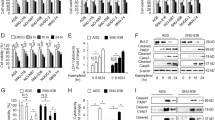Abstract
In recent years, the effects of quercetin on autophagy and apoptosis of cancer cells have been widely reported, while effects on HeLa cells are still unclear. Here, HeLa cells were subjected to quercetin treatment, and then proliferation, apoptosis, and autophagy were evaluated using MTT, flow cytometry, and MDC staining, respectively. The LC3-I/II, Beclin 1, active caspase-3, and S6K1 phosphorylation were detected using Western blot assay. The ultrastructure of HeLa was observed via transmission electron microscope (TEM). Our findings showed that quercetin can dose-dependently inhibit the growth of HeLa cells. The MDC fluorescence was enhanced with increased concentration of quercetin and hit a plateau at 50 μmol/l. Western blot assay revealed that LC3-I/II ratio, Beclin 1, and active caspase-3 protein were enforced in a dose-dependent method. However, the phosphorylation of S6K1 gradually decreased, concomitant with an increase of autophagy. In addition, TEM revealed that the number of autophagic vacuoles was peaked at 50 μmol/l of quercetin. Besides, interference of autophagy with 3-MA led to proliferation inhibition and increased apoptosis in HeLa cells, accompanied by the decreased LC3-I/II conversion and the increased active caspase-3. In conclusion, quercetin can inhibit HeLa cell proliferation and induce protective autophagy at low concentrations; thus, 3-MA plus quercetin would suppress autophagy and effectively increased apoptosis.



Similar content being viewed by others
References
Guo Y, Bruno RS. Endogenous and exogenous mediators of quercetin bioavailability. J Nutr Biochem. 2015;26(3):201–10.
Miles SL, McFarland M, Niles RM. Molecular and physiological actions of quercetin: need for clinical trials to assess its benefits in human disease. Nutr Rev. 2014;72(11):720–34.
Rajesh E, Sankari LS, Malathi L, et al. Naturally occurring products in cancer therapy. J Pharm Bioallied Sci. 2015;7 Suppl 1:S181–3.
Fernando W, Rupasinghe HP, Hoskin DW. Regulation of hypoxia-inducible factor-1α and vascular endothelial growth factor signaling by plant flavonoids. Mini Rev Med Chem. 2015;15(6):479–89.
Zhou YY, Li Y, Jiang WQ, Zhou LF. MAPK/JNK signalling: a potential autophagy regulation pathway. Biosci Rep. 2015;35(3).
Garbar C, Mascaux C, Giustiniani J, et al. Autophagy is decreased in triple-negative breast carcinoma involving likely the MUC1-EGFR-NEU1 signalling pathway. Int J Clin Exp Pathol. 2015;8(5):4344–55.
Bogoeva VP, Petrova LP, Trifonov AA. New activity of a protein from Canavalia ensiformis. Sci Pharm. 2014;82(4):825–34.
Biederbick A, Kern HF, Elsässer HP. Monodansylcadaverine (MDC) is a specific in vivo marker for autophagic vacuoles. Eur J Cell Biol. 1995;66(1):3–14.
Wei L, Liu JJ, Cao J, et al. Role of autophagy in quercetin-induced apoptosis in human bladder carcinoma BIU-87 cells. Zhonghua Zhong Liu Za Zhi. 2012;34(6):414–8.
Tao SF, He HF, Chen Q. Quercetin inhibits proliferation and invasion acts by up-regulating miR-146a in human breast cancer cells. Mol Cell Biochem. 2015;402(1–2):93–100.
Shi S, Cao H. Shikonin promotes autophagy in BXPC-3 human pancreatic cancer cells through the PI3K/Akt signaling pathway. Oncol Lett. 2014;8(3):1087–9.
Wang IT, Chou SC, Lin YC. Zoledronic acid induces apoptosis and autophagy in cervical cancer cells. Tumour Biol. 2014;35(12):11913–20.
Dwyer JM, Maldonado-Avilés JG, Lepack AE, et al. Ribosomal protein S6 kinase 1 signaling in prefrontal cortex controls depressive behavior. Proc Natl Acad Sci U S A. 2015;112(19):6188–93.
Zhang MS, Niu FW, Li K. Proflavin suppresses the growth of human osteosarcoma MG63 cells through apoptosis and autophagy. Oncol Lett. 2015;10(1):463–8.
Li Y, Li R, Zhu S, et al. Cordycepin induces apoptosis and autophagy in human neuroblastoma SK-N-SH and BE(2)-M17 cells. Oncol Lett. 2015;9(6):2541–7.
Acknowledgments
We greatly thank other members in our lab for valuable suggestions and writing.
Conflicts of interest
None
Author information
Authors and Affiliations
Corresponding author
Rights and permissions
About this article
Cite this article
Wang, Y., Zhang, W., Lv, Q. et al. The critical role of quercetin in autophagy and apoptosis in HeLa cells. Tumor Biol. 37, 925–929 (2016). https://doi.org/10.1007/s13277-015-3890-4
Received:
Accepted:
Published:
Issue Date:
DOI: https://doi.org/10.1007/s13277-015-3890-4




